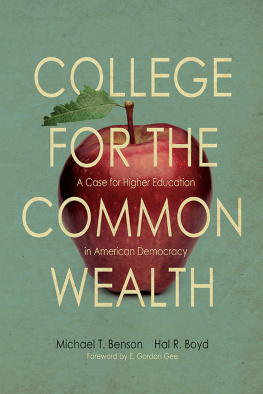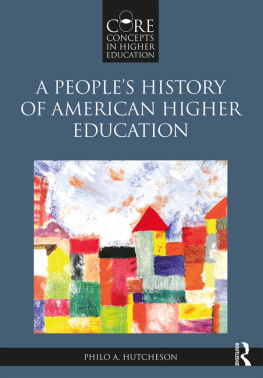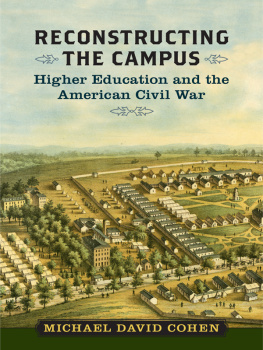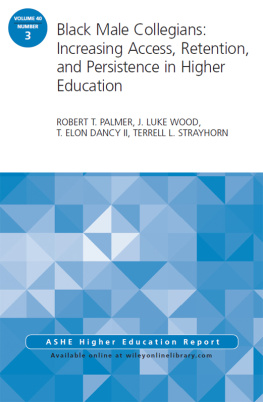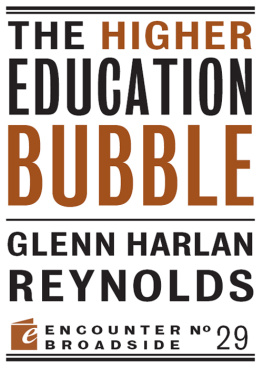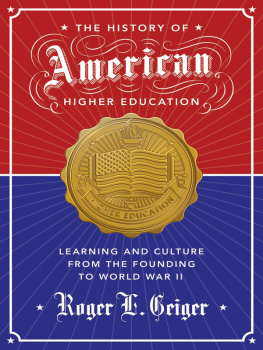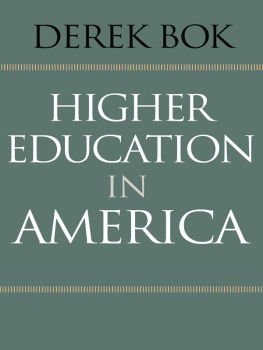
COLLEGE FOR THE COMMONWEALTH
COLLEGE
FOR THE
COMMONWEALTH
A Case for Higher Education
in American Democracy
Michael T. Benson and Hal R. Boyd
Foreword by E. Gordon Gee

Due to variations in the technical specifications of different electronic reading devices, some elements of this ebook may not appear as they do in the print edition. Readers are encouraged to experiment with user settings for optimum results.
Copyright 2018 by The University Press of Kentucky
Scholarly publisher for the Commonwealth,
serving Bellarmine University, Berea College, Centre
College of Kentucky, Eastern Kentucky University,
The Filson Historical Society, Georgetown College,
Kentucky Historical Society, Kentucky State University,
Morehead State University, Murray State University,
Northern Kentucky University, Transylvania University,
University of Kentucky, University of Louisville,
and Western Kentucky University.
All rights reserved.
Editorial and Sales Offices: The University Press of Kentucky
663 South Limestone Street, Lexington, Kentucky 40508-4008
www.kentuckypress.com
Cataloging-in-Publication data is available from the Library of Congress.
ISBN 978-0-8131-7659-8 (hardcover : alk. paper)
ISBN 978-0-8131-7660-4 (epub)
ISBN 978-0-8131-7661-1 (pdf)
This book is printed on acid-free paper meeting the requirements of the American National Standard for Permanence in Paper for Printed Library Materials.

Manufactured in the United States of America.
Member of the Association of University Presses
Contents
Foreword
During my career, I have been fortunate to serve as president of five universities: Brown, Colorado, Ohio State, Vanderbilt, and West Virginia. Each institution in its own way has helped me to see and understand the extraordinary impact of higher education. It is one of my greatest joys as president to share the message about the importance and value of higher education with anyone, from students and parents to reporters and legislators.
This message has a special resonance when I am talking about the role of higher education in strengthening our democracy. This is a fundamental but often overlooked point. By preparing educated citizens, taxpayers, and voters who will think critically, ask tough questions, and assert their opinions, our universities and colleges are continually hitting the refresh button on Americas civic web page. Our democracy is much stronger and more vibrant as a result. Michael Benson and Hal Boyd put this point front and center in their book, and all of us who are champions for the value of higher education have a powerful new tool for framing this essential message.
It is no accident that Benson and Boyd employ the word Commonwealth in the title of their book. In their capable hands, the word does double duty: the authors remind us of the enormously positive impact that higher education has had on Americas shared democracy and prosperity, and simultaneously they make a compelling case for reinvestment in higher education by Kentuckys state government. The authors are very eloquent on both counts. Higher education does, indeed, contribute substantially to our common wealth in each of our states and across all of our society.
Let me offer an example featuring two places I know well, West Virginia and Ohio. A few years ago, West Virginia University and The Ohio State University joined forces to launch the Marcellus Shale Energy and Environmental Laboratory to make the most of the natural gas that lay under these two states. We brought industry (Northeast Natural Energy) and a national laboratory (the National Energy Technology Laboratory) to the table as partners for the first comprehensive, long-term field study of shale gas resources. This multifaceted partnership conducts research and generates knowledge that will help to guide the transformation of our states respective economiesand our nations energy usage mix. (The partnership also gives a whole new meaning to the old expression, Now youre cooking with gas.)
To make their case about the value of American higher education, Benson and Boyd employ a skillfully syncretic blend of voices, from Aristotle and Aesop to Wendell Berry and J. D. Vance, to illuminate the challenges that confront higher education. While you may have read some of these authors before, I predict that you will see their words in a different light after reading how Benson and Boyd apply them in this context. If you are looking for new arrows for your rhetorical quiver in defense of higher education, you will find them in these pages.
The authors also offer an effectively eclectic set of examples to illustrate potential solutions for higher education. From continuous improvement in Toyotas automobile plants to self-correction and accountability in child welfare offices in Alabama and Utah, Benson and Boyd demonstrate how higher education can learn from other domains. Gathering together these anecdotes from disparate sources is another strength of this volume. The authors astute analysis of how these approaches can improve higher education is significant value added.
I appreciate that Benson and Boyd do not, as some critics of higher education have done, simply point to success in other sectors of our society and economy as perfect exemplars and chastise higher education for not blindly following that lead. Academe is different from business and government. That seems like common sense, but common sense is not a flower that grows in everyones garden. Lessons are transferable from one sector to another, but the transfer requires thought and creativity. This book serves as a useful how-to guide.
I also applaud Benson and Boyds unapologetic conviction that each state has something to teach all of the others. As US Supreme Court justice Louis Brandeis observed, A single courageous state may, if their citizens so choose, serve as a laboratory and try novel social and economic experiments without risk to the rest of the country. I believe Benson and Boyd are calling on Kentucky to be such a courageous state, and I believe the Bluegrass State will benefit if it heeds their call. I believe there is wisdom to be gleaned from the experience and experimentation of smaller, more rural states such as Kentuckyand my own state of West Virginia. We may not always get it right, but then again, the best ideas do not invariably come from the coasts or the largest cities. The places that make up flyover country have something to contribute, and this book captures that spirit admirably.
There is no shortage of books about higher education. There may be, however, a shortage of concise, insightful, relevant, and useful books about higher education. Benson and Boyds fine work goes a long way toward filling that gap. Thanks to them, now whenever I think and talk about the importance and value of public higher education to American democracy, I will have an excellent resource on which to rely.
E. Gordon Gee
Morgantown, West Virginia
Introduction
Making the Case for Reinvestment
When he encountered Kentuckys frontier for the first time, folk hero Daniel Boone christened the land a second paradise. He returned to his family with a determination to bring them as soon as possible.1 Today, the Commonwealth still boasts lush landscapes and natural resources; yet, as the globally competitive economy is increasingly knowledge based, Kentuckys fertile minds are as important as the states fertile soil.2 The Daniel Boones of tomorrow will be as attracted to the states human resources as the natural ones.
Next page
